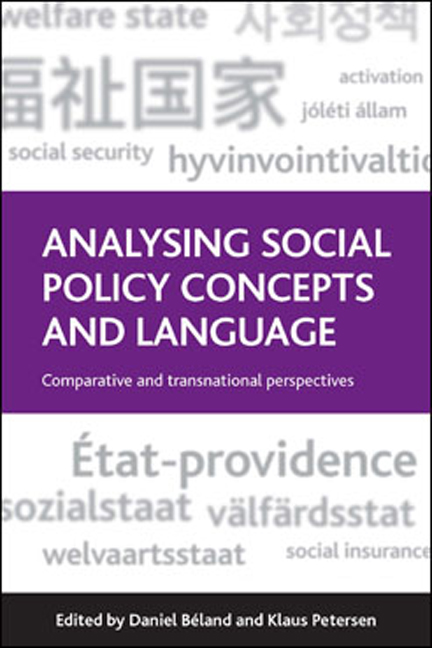Book contents
- Frontmatter
- Contents
- List of figures and tables
- Acknowledgement
- Notes on contributors
- Introduction: social policy concepts and language
- one Social policy language in Denmark and Sweden
- two The changing language of social policy in Hungary and Polan
- three Languages of ‘social policy’ at ‘the EU level’
- four The OECD's search for a new social policy language: from welfare state to active society
- five The discursive power of international organisations: social policy language and concepts in the World Bank and the International Monetary Fund
- six Original and imitated or elusive and limited? Towards a genealogy of the welfare state idea in Britain
- seven Social policy concepts and language in France
- eight The language of social politics in Finland
- nine Germany: constructing the ‘win-win’ society
- ten Conceptual development of welfare and social policy in Japan
- eleven Transition to the ‘universal’ welfare state: the changing meaning of ‘welfare state’ in Korea
- twelve The Dutch ‘caring state’
- thirteen Panacea, problem or perish: social policy language in New Zealand
- fourteen Evolving social policy languages in Spain: what did democracy and EU membership change?
- fifteen Social policy language in the United States
- Conclusion: comparative perspectives on social policy language
- Index
Introduction: social policy concepts and language
Published online by Cambridge University Press: 04 March 2022
- Frontmatter
- Contents
- List of figures and tables
- Acknowledgement
- Notes on contributors
- Introduction: social policy concepts and language
- one Social policy language in Denmark and Sweden
- two The changing language of social policy in Hungary and Polan
- three Languages of ‘social policy’ at ‘the EU level’
- four The OECD's search for a new social policy language: from welfare state to active society
- five The discursive power of international organisations: social policy language and concepts in the World Bank and the International Monetary Fund
- six Original and imitated or elusive and limited? Towards a genealogy of the welfare state idea in Britain
- seven Social policy concepts and language in France
- eight The language of social politics in Finland
- nine Germany: constructing the ‘win-win’ society
- ten Conceptual development of welfare and social policy in Japan
- eleven Transition to the ‘universal’ welfare state: the changing meaning of ‘welfare state’ in Korea
- twelve The Dutch ‘caring state’
- thirteen Panacea, problem or perish: social policy language in New Zealand
- fourteen Evolving social policy languages in Spain: what did democracy and EU membership change?
- fifteen Social policy language in the United States
- Conclusion: comparative perspectives on social policy language
- Index
Summary
Exploring social policy language and concepts
Social scientists, historians, and linguists have noted that the terms, metaphors, and concepts we use are far from innocent and are closely tied to political struggles and international exchanges. Therefore, from a comparative and international perspective, studying terminology and concept formation is an important part of both political and policy analysis (Williams, 1976; Sartori, 1984; Farr, 1989; Heywood, 2000; Daigneault, 2012). This is also the case when it comes to social policy. The words we use to make sense of social policy and the way we use them need to be properly studied to get the definitions right while grasping the political consequences of social policy language. But so far, relatively little has been done in that respect.
In recent years, researchers have rightly complained about the vagueness of core concepts used in contemporary social policy debates. For example, following well-known predecessors such as Asa Briggs (1973–74, 1985) and Richard Titmuss (1963), John Veit-Wilson (2000, 2003) and Daniel Wincott (2001, 2003) have criticised the tendency among social policy students and practitioners to use the concept of ‘welfare state’ without offering any coherent definition of it. As Wincott (2001: 409) puts it, ‘While the expression of “the welfare state” has many interpretations and connotations – both academic and popular – there are surprisingly few clear discussions of the concept… . [The] field does need to be mapped’. Social policy concepts are subject to many interpretations, partly because they are dynamic historical constructions. Thus, one way to map this field and explore the boundaries of social policy is to take a comparative look at the history of concepts like ‘welfare state’ (Beland, 2011; Petersen and Petersen, 2013). Even though a number of key social policy concepts (such as ‘Wohlfahrtsstat,’ ‘Sozialstaat,’ or ‘Sozialpolitik’) have a German origin, most of the English language discussions on social policy language (for example in Flora and Heidenheimer, 1981; Alber, 1988; Lowe, 1999; Powell and Hewitt, 2002; Titmuss 1963) focus on Great Britain , as it was British Archbishop William Temple (1941) and others who popularised the term ‘welfare state’ during the Second World War, and paved the way for its political breakthrough in the late 1940s (Figure I.1).
- Type
- Chapter
- Information
- Analysing Social Policy Concepts and LanguageComparative and Transnational Perspectives, pp. 1 - 12Publisher: Bristol University PressPrint publication year: 2014

